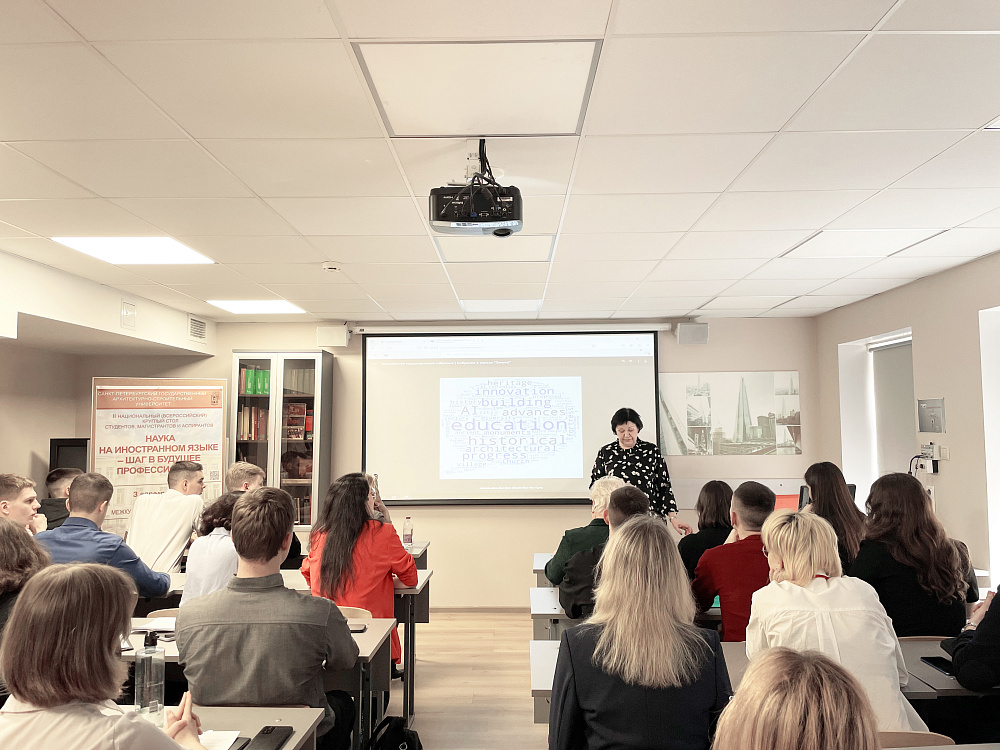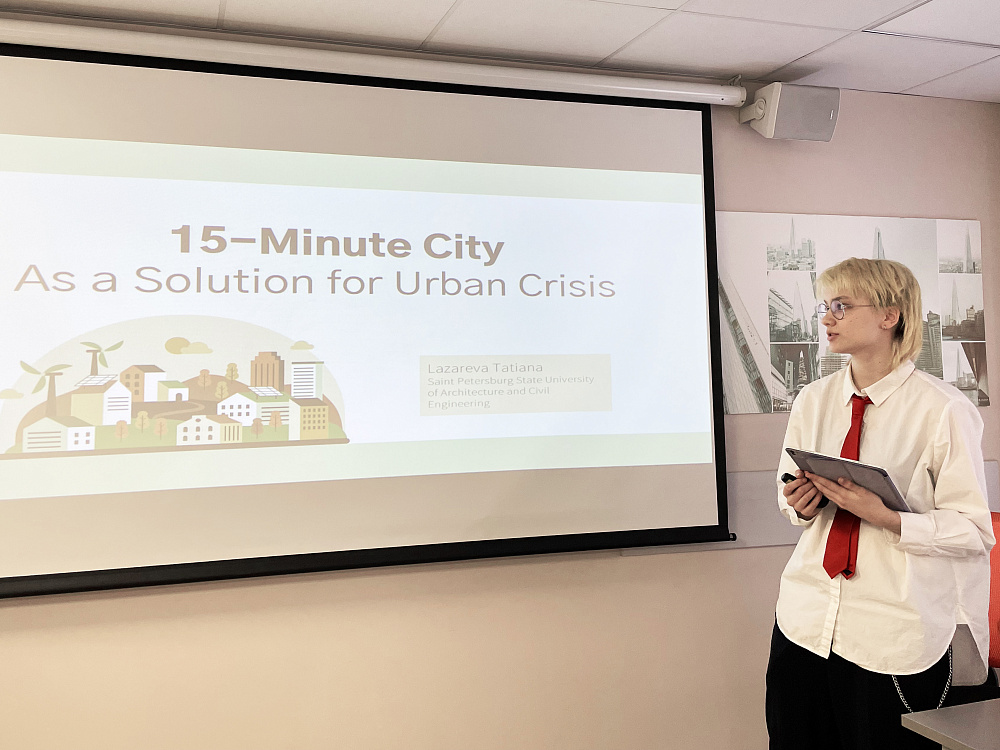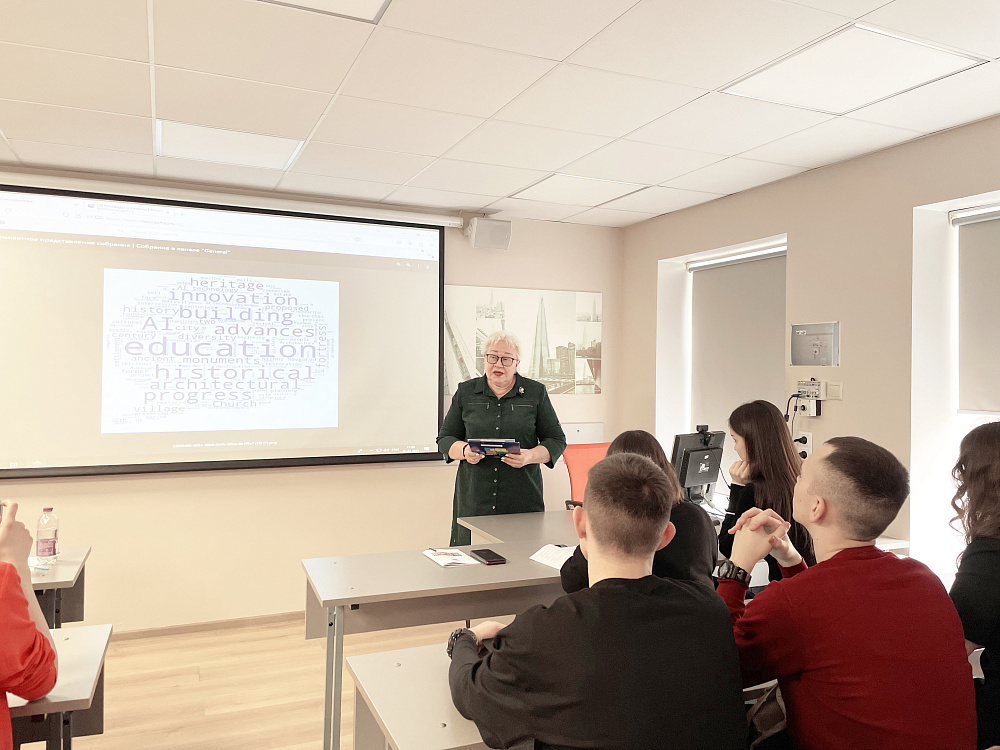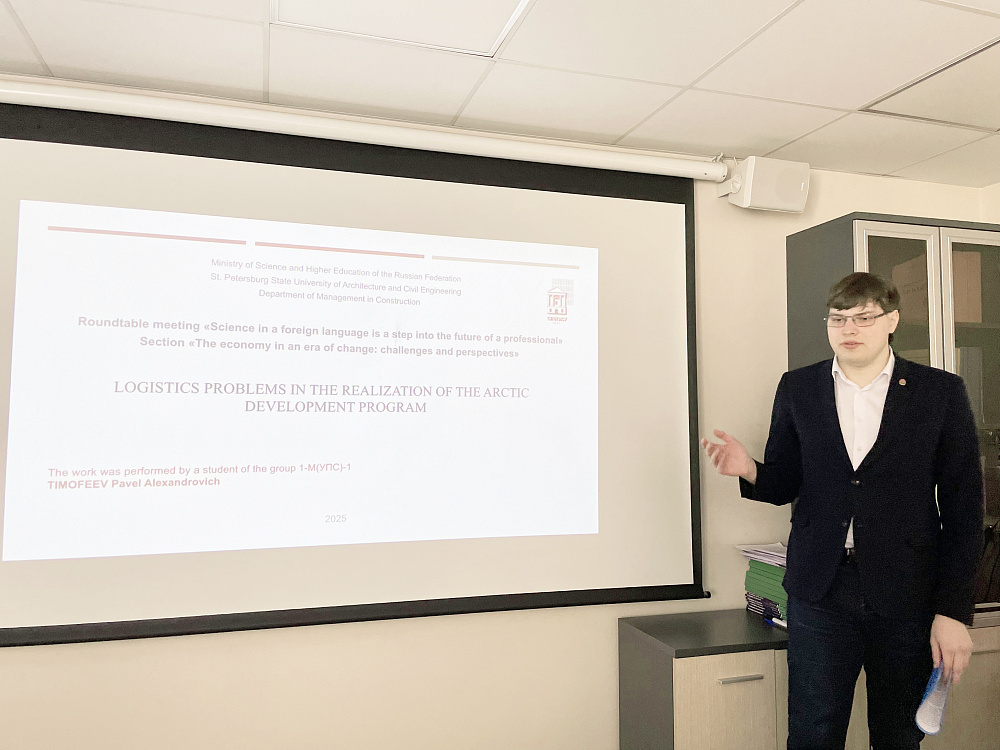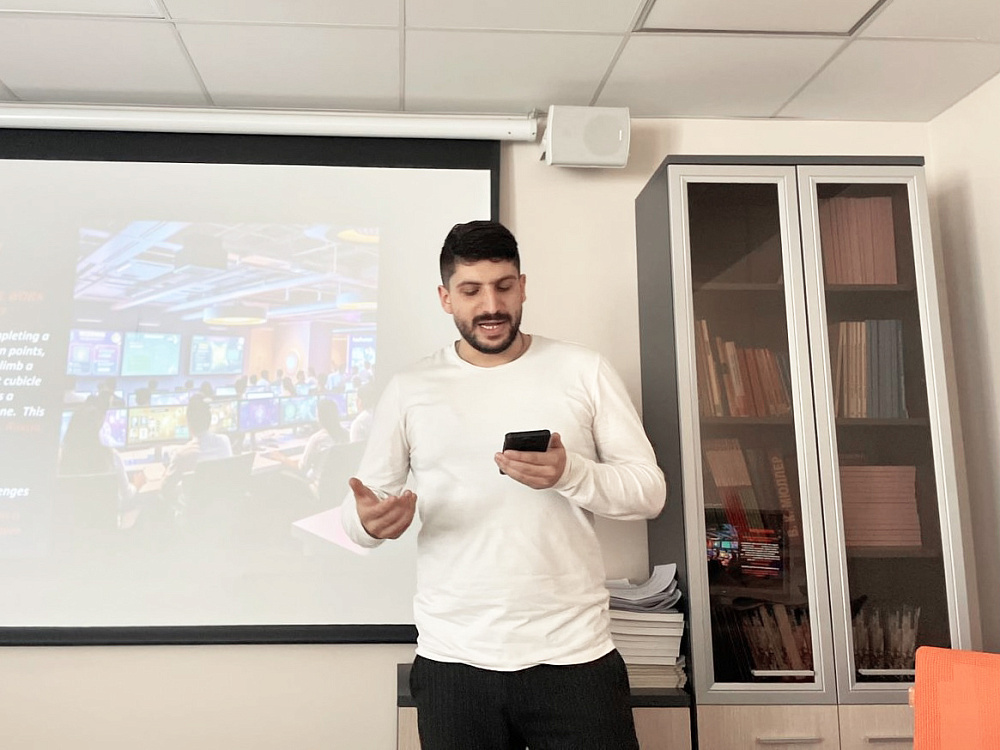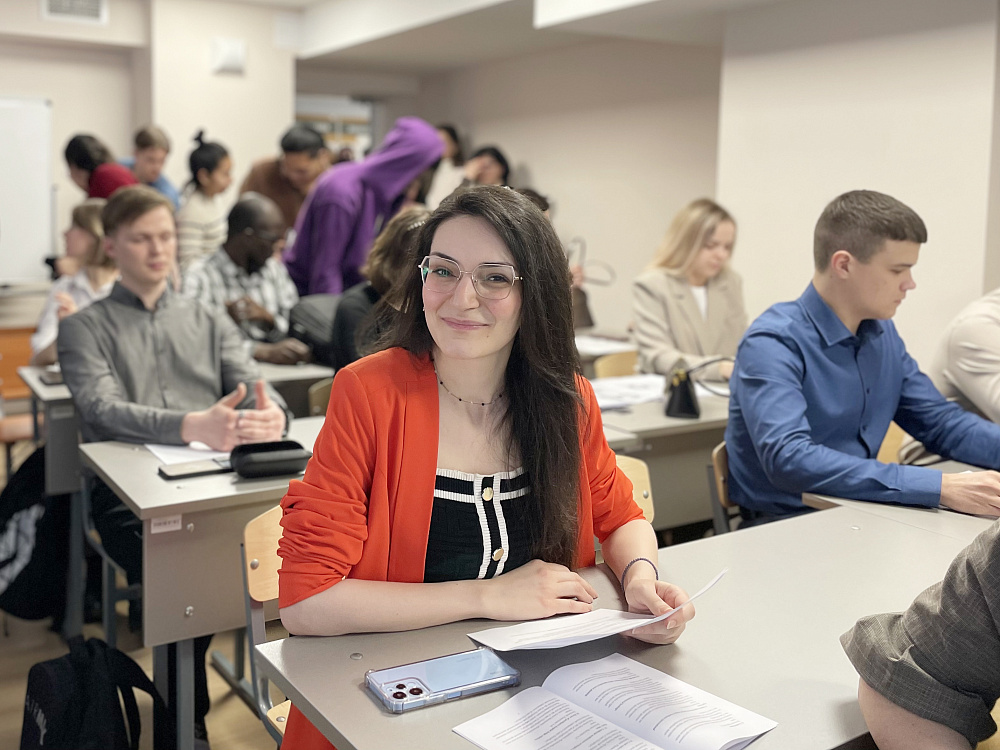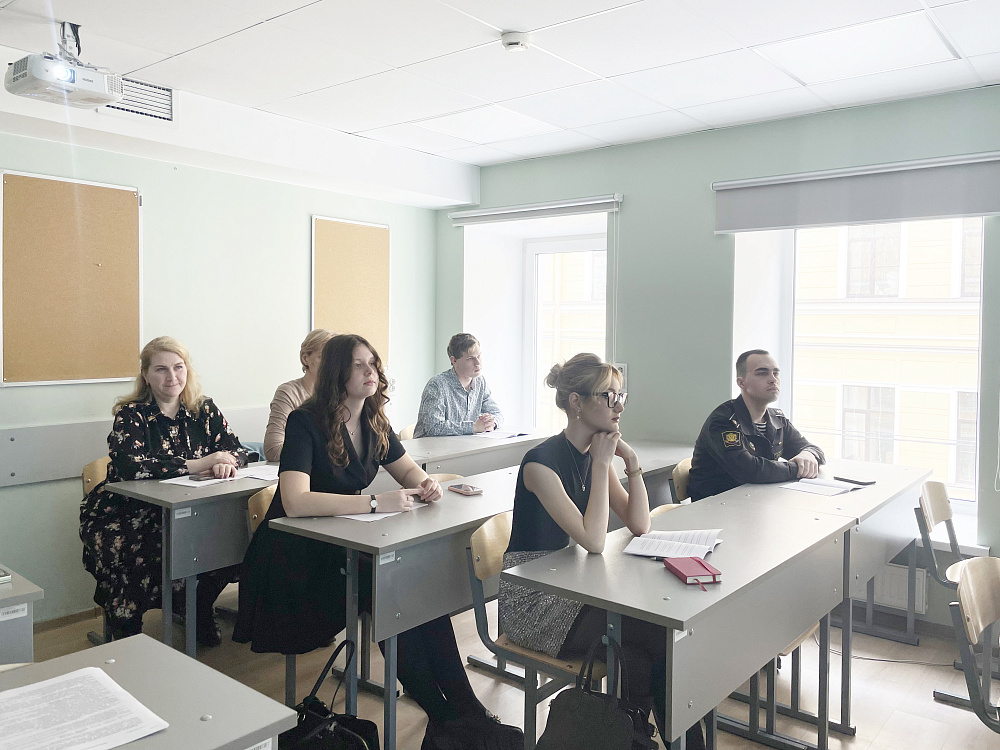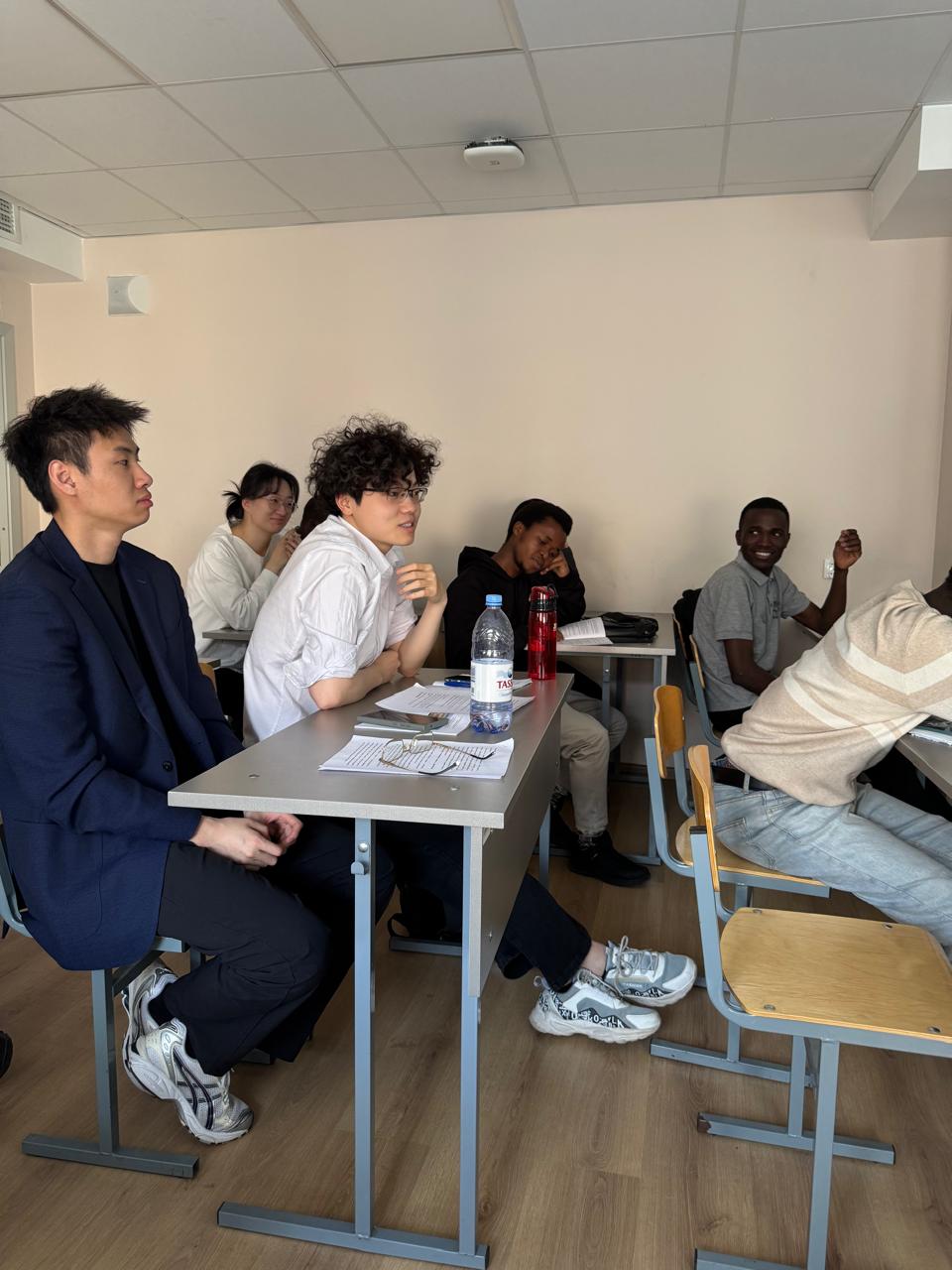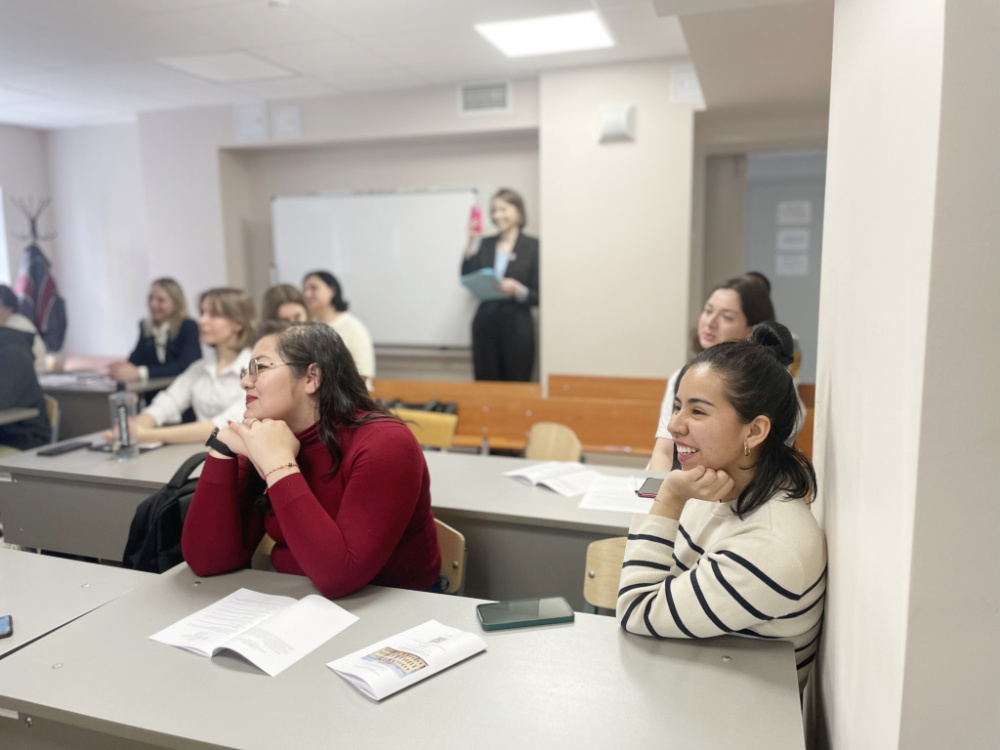 Participants and audience of the section "Architecture today and tomorrow: design, innovation and trends"
Participants and audience of the section "Architecture today and tomorrow: design, innovation and trends"
On 3 April, the SPbGASU Department of Intercultural Communication held the II National (All-Russian) Round Table “Science in a Foreign Language as a Step into the Future of a Professional”.
This year, the round table brought together students, postgraduates and graduate students from St Petersburg, Moscow, Nizhny Novgorod, Penza, Omsk, as well as students of the preparatory department of SPbGASU and students studying in master's and PhD programs from China, Morocco, Algeria, Serbia, who presented the results of their scientific research in English and Russian as a foreign language.
The chairperson of the organizing committee, Head of the Department of Intercultural Communication Elena Selezneva addressed the participants with a welcoming speech, expressing confidence in that in the modern world, knowledge of a foreign language is no longer just an advantage, but a necessity for success in any scientific field. The ability to convey your scientific ideas, regardless of language barriers, is of decisive importance.
The deputy chair of the organizing committee, Professor at the Department of Intercultural Communication Elena Chirkova also gave a welcoming speech. Elena Ivanovna spoke about the word cloud created last year – a visual representation of key concepts and ideas that arose during the discussions.
The round table was organized in four areas: architecture, construction, economics and intercultural communication.
Section "Architecture today and tomorrow: design, innovation and trends"
The section meeting discussed a wide range of issues in the modern development of architecture and the preservation of cultural heritage, including the role of lighting, innovative approaches to design, the development of the urban environment and leisure infrastructure, and technologies for the restoration of historical buildings in Russia and abroad.
Anastasia Nasedkina (SPbGASU) presented a report on “Landscape architecture techniques for designing public spaces in northern cities.”
"My report was dedicated to landscape architecture techniques in designing public spaces in northern cities based on the concept of a "winter city". I chose this topic because projects often do not take into account how the object will look or be used in winter, and this can be a very long period," Anastasia shared.
Tatiana Lazareva (SPbGASU) presented a report entitled “15-minute city as a solution for urban crisis.”
"I reviewed the model of urban development aimed at creating comfortable, accessible and environmentally friendly urban spaces. I listed the key principles of this approach, successful examples of its implementation in different countries, as well as the challenges that modern megacities face," the student said.
Section "Construction today and tomorrow: design, innovation and trends"
The participants of this section raised such important issues as geological surveys to ensure safety in construction, innovative technologies and building materials and their properties for the stability of structures.
Liu Zichi (SPbGASU) spoke about approaches to the restoration of historical buildings in China and Russia. The audience also learned about the differences in the choice of building materials between the two countries, which are influenced by the natural environment, climate conditions, cultural traditions and conditions of technological development.
Yassin Sekuri (SPbGASU) covered the topic “Application of innovative construction technologies in cramped urban environments.”
"The use of innovative technologies in construction in urban development conditions is a necessary step for sustainable urban development. Digitalization and modular technologies improve the quality of construction, reduce timeframes and minimize the impact on the environment. Safety at construction sites is maintained through new monitoring and automation systems," Yassin is confident.
Section "Economy in the era of change: challenges and prospects"
The section's reports were devoted to the problems of logistics and digitalization, ecology and tourism, motivation and communication in the economic sphere. It is also worth noting the participants' interest in using artificial intelligence to solve practical problems.
Vladislav Tikkoev (SPbGASU) introduced the audience to the prospects and difficulties of the transition to electronic executive documentation in construction.
"In my report, I drew attention to new methods of maintaining documentation during the implementation of capital construction projects. Modern EDM tools now also apply to such an important aspect of the activities of construction companies as the certification of completed works. I cited the main provisions that regulate the forms and procedure for maintaining documentation, distribute areas of responsibility between construction participants, and also provided examples from domestic and foreign practice. I spoke about the problems and prospects of using digital forms of acts in the conclusion. In further research, I will assess the impact of a systematic approach to the preparation of executive documentation on the financial stability of organizations and the feasibility of capital construction projects," said Vladislav.
Pavel Timofeev (SPbGASU) presented a report entitled “Logistics problems in the realization of the Arctic development program.”
"My report is dedicated to the main tasks set by the Strategy for the Development of the Arctic Zone of the Russian Federation and Ensuring National Security for the Period up to 2035, as well as logistical problems that may hinder the implementation of these tasks. The report reveals why the projects specified in the strategy, which are of strategic interest to our country, may be under threat, and what decisions are being made to prevent these threats or minimize their consequences," Pavel said.
Jamil-Nezhar Benshaban (Saint Petersburg State Forestry University named after S. M. Kirov) presented a report on “The Impact of Artificial Intelligence and Gamification on the Motivation of Company Employees”.
"What if work felt less like work and more like a game? Imagine this: You're at your desk, completing a project, and suddenly – ding! – you earn points, unlock a badge, and see your name climb a leaderboard. Your colleague in the next cubicle high-fives you, and your boss sends a personalized reward. This isn't science fiction. Companies in Algeria, Russia and around the world are using AI and gamification to turn mundane tasks into exciting challenges", – reported Jamil-Nezhar.
The speaker looked at the reasons why people loved games; gave examples of how this method was used in some companies; called for starting small – creating a leaderboard for a weekly team challenge, use AI tools to survey employees and tailor rewards. In his opinion, we need to think globally: “The future of work isn't about forcing people to stay - it's about making them want to stay.”
Section "Intercultural communication, language interaction and translation practice"
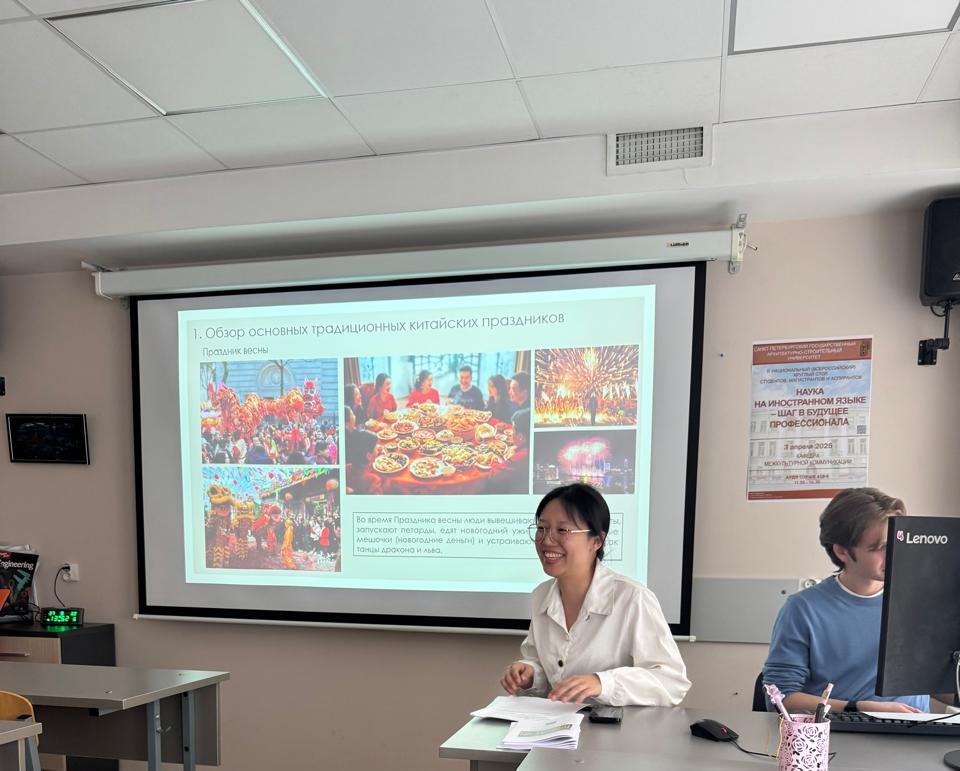 PhD student Li Ruimin, participant of the section "Intercultural communication, language interaction and translation practice"
PhD student Li Ruimin, participant of the section "Intercultural communication, language interaction and translation practice" During the work of this section, reports were heard on current issues of translation of scientific and technical texts; special attention was paid to the prospects of using artificial intelligence for translation purposes. In addition, the participants conducted a comparative analysis of the organization of the educational process in Russian and Chinese universities. Everyone agreed on the importance and necessity of studying a foreign language for future professional activity.
Martina Kojović (SPbGASU) presented a report "Serbian and Russian. Language proximity - help or obstacle in mastering the Russian language?" According to the student, the linguistic proximity of Serbian and Russian can be both an assistant and an obstacle in learning. It is important to be aware of the similarities and differences in order to effectively master the language, avoiding traps and "false friends" (words that are similar but have different meanings), grammatical errors.
The sections were moderated by students Anna Aleshina, Daria Nikulina, Sofia Myagkaya and Fedor Romanchuk, who successfully completed the professional training program “Translator in the Sphere of Professional Activity” last year.
"This was my first experience moderating a round table. From it I learned the importance of flexibility and the ability to adapt to unexpected situations, which will certainly come in handy in the future. I enjoyed interacting with an active audience and, of course, I would like to develop in this direction," Fedor shared.
"It was interesting to try myself in a new role and learn more about modern architectural research. I gained valuable experience - I learned how to build interaction between the speaker and the audience, and also met interesting people," said Anna Aleshina.
A round table in a foreign language is not only a platform for discussing the results of scientific research, but also an opportunity to improve language skills, which are a significant component of professional growth.
This year the round table program was very rich. Participants of all sections raised topical issues that are of serious scientific interest.
The SPbGASU Department of Intercultural Communication expresses gratitude to all participants and invites them to discuss new scientific achievements next year.









